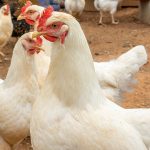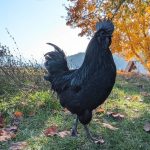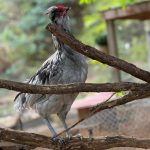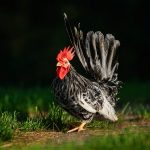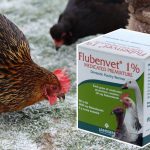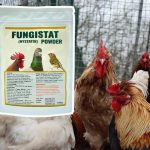A Guide To The World’s Most Expensive Chicken Breeds (And Their Cheap Alternative)
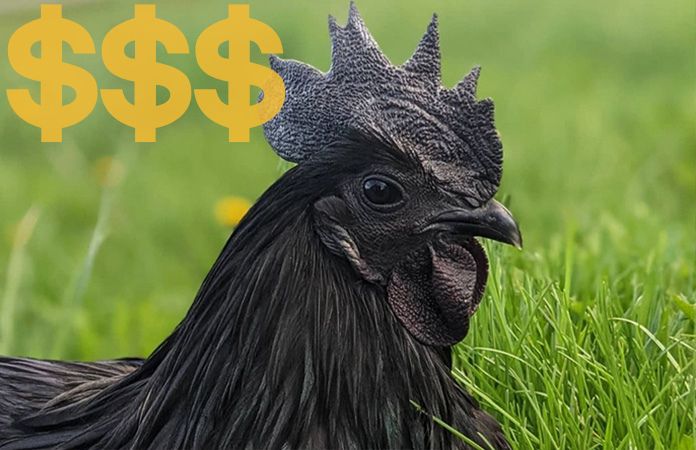
We are naturally fascinated with everything rare and expensive, including chicken breeds. While these breeds are stunningly beautiful, they are not the most affordable option for your backyard. But fear not; you can opt for a more pocket-friendly chicken that looks strikingly similar!
The Most Expensive Chicken Breeds
We have a natural inkling as humans to admire rare, expensive things. Designer handbags, shoes and dogs are all the rage all over the world. According to a Forbes analysis, the more expensive products are, the more in demand they are!
The same is true for chickens. The rarer breeds (usually imported) can cost thousands of dollars per chick. They are associated with being better because they are expensive.
The reality is that these chickens behave similarly and have comparable outputs (meat and eggs) as most other chickens. In general, people want them for their aesthetic value.
If you fall in that category, a less expensive chicken with a similar appearance might be a better option. As a good designer handbag or sunglasses copycat, you can probably adopt chickens that are much less expensive but of similar appearance.
They will ultimately have a comparable output for you as an owner, whether you are raising them purely as pets, egg producers, or egg and meat producers.
Top 10 Most Expensive Chicken Breed
- Ayam Cemani
- Dong Tao
- Owlbeard
- Ayam Ketawa
- Bantam Bielefelder
- Olandsk Dwarf
- Bruges Fighter
- Deathlayer
- Indio Gigante
- Barnevelder
If you’re thinking on splurging on a rare, pricey chicken, hold your horses before clicking that ‘buy’ button. Why not check out some affordable options first and save some bucks?
We’ll address the world’s most expensive chicken breeds and their cheap(er) alternatives.
1. Ayam Cemani
The Ayam Cemani is rare because it is completely black and looks unique. Its bones, organs, skin, feet, beak, tongue, wattles, comb, and feathering are all completely black. Everything but the eggs!
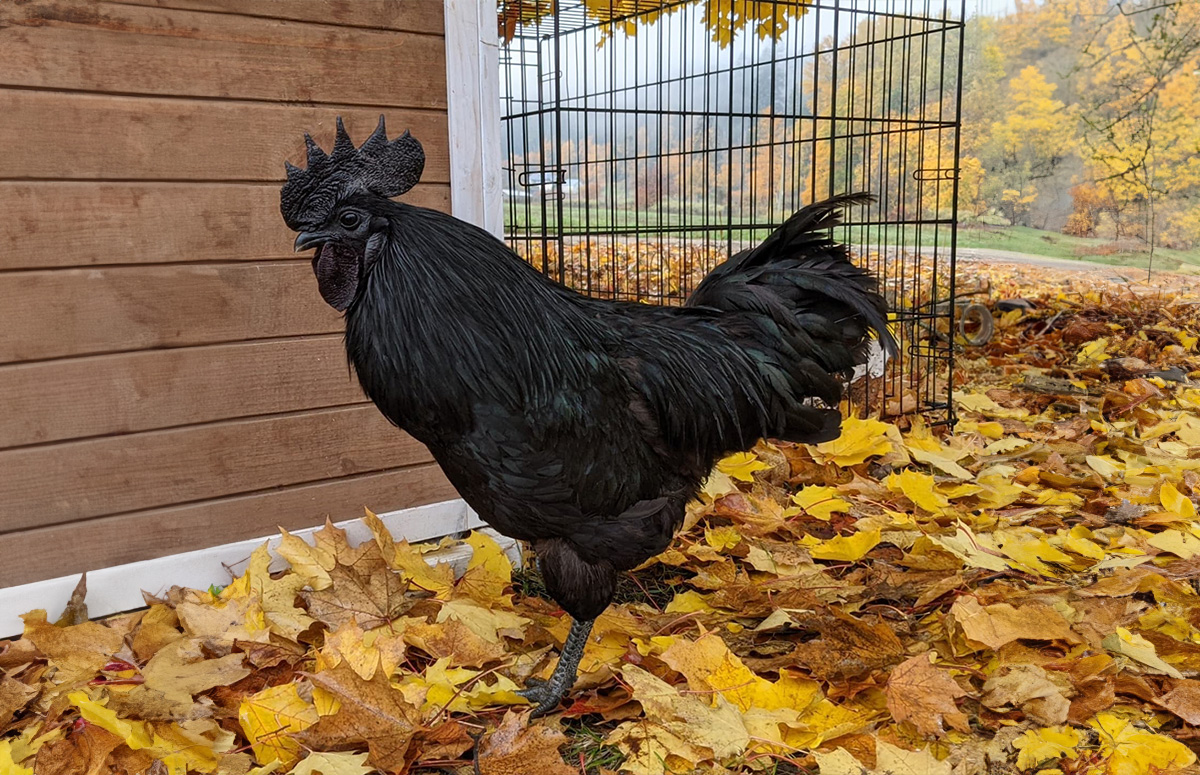
While beautiful, they are fairly unproductive chickens. They are not very large (under 5 pounds), and hens only lay up to 100 eggs yearly. Depending on the string, they can cost anywhere between $70 and $2500 for an unsexed chick.
Furthermore, they aren’t a recognized breed (yet) by the American Poultry Association.
Alternatives for the Ayam Cemani
If you’re looking for black chickens, do you really need the most expensive model? You can probably pick a different breed. Other alternative black designer chickens will cost much less and will likely even produce more meat and eggs for your family.
- Mystic Onyx: These are interesting-looking dark chickens and a cross-breed between silkies and a larger chicken. They may have twinges of red, orange, or greenish hues, but they look almost entirely black. They lay over 200 eggs yearly and have more meat than an Ayam Cemani.
- Fibro Easter Egger. These birds have a condition, fibromelanosis, which causes hyper-pigmentation. They are all black as a result! They have all black skin, lobes, and feathers. They are Easter Eggers, meaning they produce colored eggs, from green to blue to even pink or creamy yellow.
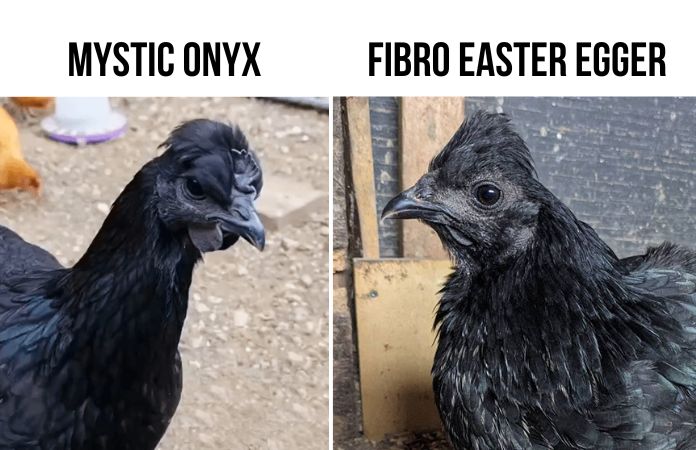
Comparing Ayam Cemani and Alternatives
Do you really need the Louis Vuitton, or will a different black handbag look nice enough and even more functional? Think about what you really want from your chickens and how they compare. For more alternatives, check out our ‘Beautiful Black Chicken Breeds‘.
| Ayam Cemani | Mystic Onyx | Fibro Easter Egger | |
| Eggs | 60-100 eggs per year | 220 eggs per year | 220 eggs per year |
| Egg Color | Cream | Light brown | Blue, green, pink, yellow, brown |
| Egg Size | Small | Medium | Medium |
| Weight | 3.5-5 pounds | 5-6 pounds | 5-6 pounds |
| Hardiness | Cold and heat tolerant | Cold and heat tolerant | Cold and heat tolerant |
| Temperament | Friendly and docile | Friendly and peppy | Friendly and docile |
| Beginner-friendly | Yes | Yes | Yes |
| Color | Pure black, even the organs and bones | Black, with some orange/red highlights | Black, with some colors |
| Cost | $70-$2500 a chick | $3-$4 a chick | $15-$30 a chick |
2. Dong Tao
These Dong Tao Vietnamese chickens are famous for having delicious meat and the largest feet of any other breed. The huge feet and legs have scales, giving it the nickname of Dragon Chicken. No other chicken looks quite like them!
Real Dong Tao’s hail from one of 17 families in a cooperative in the Dong Tao commune in Vietnam. You might only know you have a real pair if you purchase a couple from one of these families.
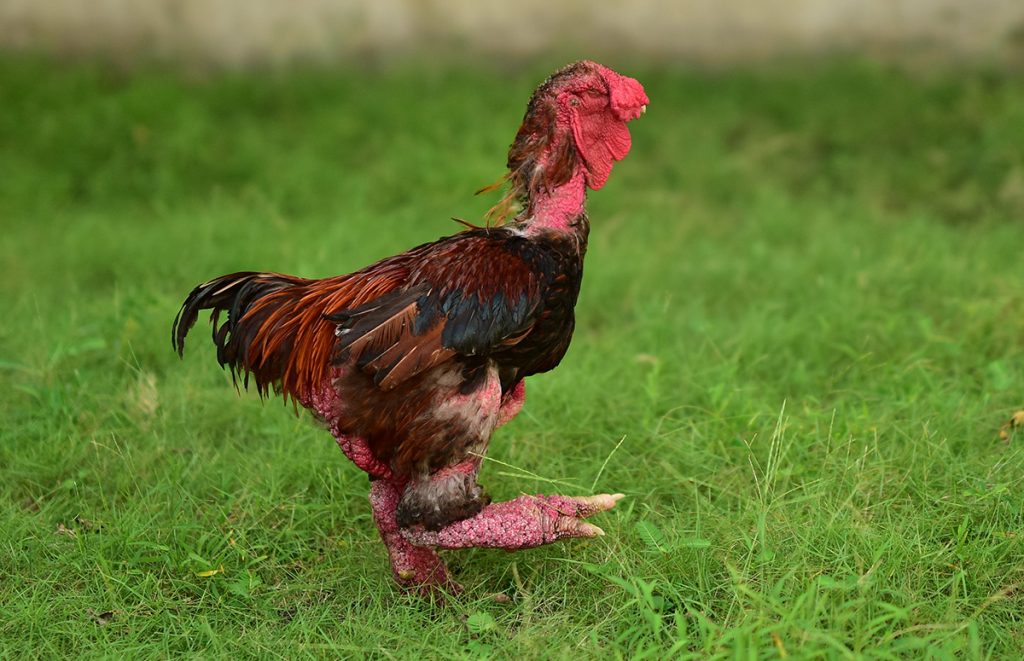
They were bred specifically for royals, and are now popular for Tet (Lunar New Year) celebrations in Vietnam. They’re so expensive ($1000 to $2000 for an adult chicken) because they are tricky to breed.
They are picky about temperature and need heating when it is below 15 degrees Celsius. They are also prone to disease. Yet another issue is that their large feet and legs end up crushing eggs. To hatch correctly, the hens need some help from their owners or need to be incubated.
According to breeders, the chickens themselves require a special diet (rice, corn, and free-range insect eating) and specific instructions for exercise to produce foot and leg muscles. They can get as big as 15 pounds.
Alternative to the Dragon Chicken: Indio Gigante
Indio Gigante’s don’t have amazing dragon legs; otherwise, they share a similar appearance and won’t break your bank! An unsexed chick will cost around $70.
Indio Gigante translates to “Giant Indigenous” in Brazilian Portuguese. They are a cross-breed with a local indigenous chicken.
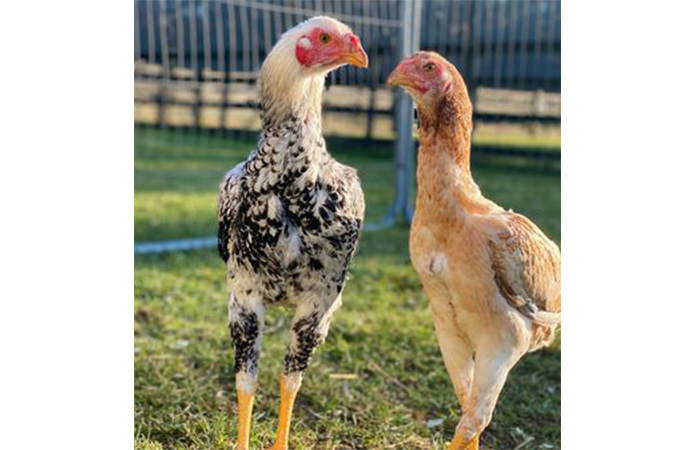
They are one of the largest chickens in the world, and will be the first pure breed chicken to hail from Brazil if their breeder association gets their petition through within the next few years. Roosters are over a meter tall and can be up to 4 feet.
| Dong Tao | Indio Gigante | |
| Eggs | 60 per year | 160 eggs per year |
| Egg Color | Off-white | White, beige, blue, green or red |
| Egg Size | Large | Large |
| Weight | 9 to 15 pounds | 6 to 11 pounds |
| Hardiness | Cold tolerant, though warmer temperatures better | Cold and heat tolerant |
| Temperament | Friendly | Friendly and tranquil |
| Beginner-friendly | No | Yes |
| Color | Purple skin covered by shiny, multicolored feathers | Any color feathers, usually brightly colored, always with yellow/orange feet and legs |
| Cost | Usually have to purchase adults from Vietnam, $2,500 a pair | $70 per unsexed chick |
3. Owlbeard
These birds look majestic and even ancient, yet maybe you can’t place why? You probably saw them in a famous painting! Likely the oldest Dutch breed, Owlbeards are famous in a number of different Dutch masterpieces dating back to the early 1500s. They have a distinct look – no wattle, a beard and muffs, a v-shaped comb, and a generous and stately curve in the back.
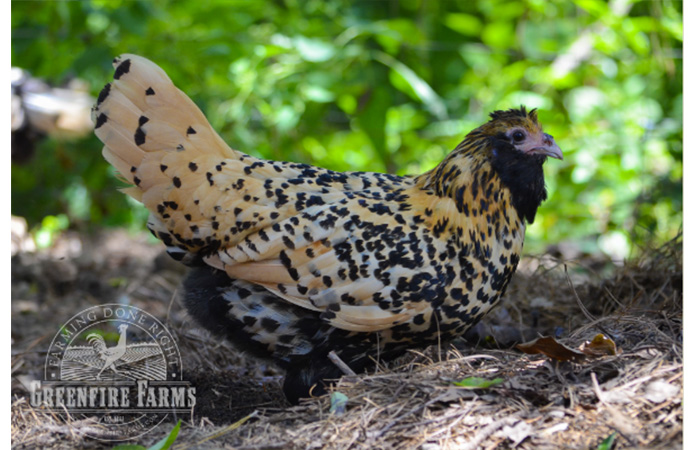
They’re in high demand for their capacity to make your backyard look like an art museum. Since they’re imported from the Netherlands, and so many people want them, they can be pricey. Expect to pay $70 for a chick.
Owlbeard Alternative: Easter Egger Bantam
Easter Egger Bantam varieties can add some similar flair to your backyard, at a much lower price point. They have the same style of muffs and ear tufts with a missing wattle and unique comb. What makes them fun, too, is the fact that they lay a variety of colored eggs.
| Owlbeard | Easter Egger Bantam | |
| Eggs | 150-200 per year | 200-280 per year |
| Egg Color | White | Blue, green, creamy yellow, pink, brown |
| Egg Size | Large to jumbo | Medium to large |
| Weight | 4 to 6 pounds | 5.5 to 6.5 pounds |
| Hardiness | Cold tolerant, will lay in the cold | Cold or heat tolerant |
| Temperament | Tame but active | Friendly with personality |
| Beginner-friendly | Yes | Yes |
| Color | Comes in a variety of colors, bright contrast patterns | A variety of colors |
| Cost | $70 per unsexed chick | $16 per sexed chick |
4. Ayam Ketawa
These are Indonesian chickens that, until recently, could only be owned by the royal family. They are revered for their crow. They do not cock-a-doodle, but laugh. Their name means “laughing chicken” in the local language.
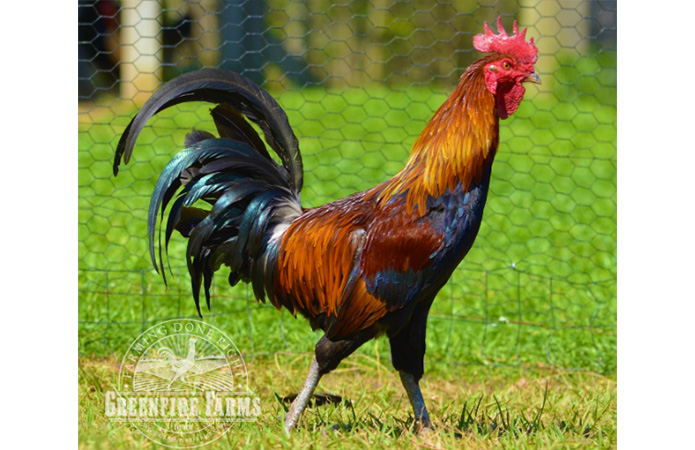
Breeders actually subclassify the breed based on the length and style of their laugh. Indonesia holds an annual award for the best crow in each category.
They vary in color but have long, silky feathers. Roosters have especially flowery neck feathers, often red, giving them quite a regal appeal.
Alternative for the Ayam Ketawa: Phoenix
The Phoenix chicken does not have the amazing laughing crow of the Ayam Ketawa, but they do have beautiful long red neck feathers. If you are considering adding an Ayam Ketewa to your family but are more interested in the looks than the laugh, you might consider a Phoenix.
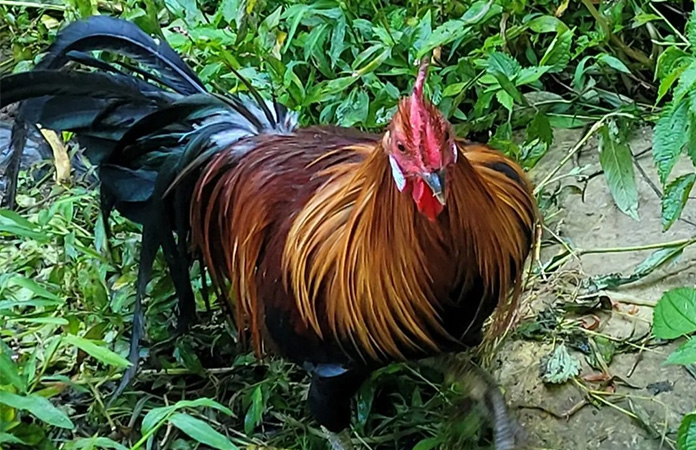
Phoenix chickens might even be more aesthetically appealing than Ayam Ketawa, with long, flowy tail feathers that catch the eye from anywhere on your patio. They also have interesting personalities, known for their independent nature, that can make them fun to watch.
They were partially derived from Japanese Onagadori chickens bred for such qualities, with up to 27 feet long tails.
They are more of a pet than a producer and might not be the best for children. But if you like their look and their personality, they could be a match for you.
| Ayam Ketawa | Phoenix | |
| Eggs | 100 per year | 150 per year |
| Egg Color | White to light brown | Cream or tinted |
| Egg Size | Small to medium | Small |
| Weight | 5 to 7 pounds | 4 to 5.5 pounds |
| Hardiness | Not cold tolerant | Heat preferred |
| Temperament | Friendly and docile | Friendly, a bit aloof |
| Beginner-friendly | Yes | No |
| Color | Multicolored, usually males have red neck feathers | Three colors – silver, golden, or black-breasted red |
| Cost | $60 per unsexed chick | $5 per unsexed chick |
5. Bantam Bielefelder
The Bielefelder was developed in the 1970s in Germany. Soon there was a Bantam version, a smaller chicken that is renowned for its docile temperament and large egg productivity. If you have limited space but still want a decent amount of productivity (or just like the smaller chicken), these are a great variety to keep.
Bielefelders are auto-sexing. That means that a breeder can tell the sex of chicks apart by their color. They’re expensive because they are not usually bred abroad and must be imported from Germany.
Bantam Bielefelder Alternative: Bantam Welsummer
The Welsummer is a Dutch breed known for good egg yields, serving as producers for egg exports in the early twentieth century. The Bantam variety produces even more eggs than the Bielefelder, with a similar body size, at a much lower price point. They are also an “autosexing” breed.
| Bantam Bielefelder | Bantam Welsummer | |
| Eggs | 160 per year | 180 |
| Egg Color | Brown | Dark brown |
| Egg Size | Small | Small |
| Weight | 2-3 pounds | 2-3 pounds |
| Hardiness | Cold and heat tolerant | Prefer cold, but can stand heat with some shade |
| Temperament | Undemanding and robust | Friendly, but loud |
| Beginner-friendly | Yes | Yes |
| Color | Reddish over a crele (black and white base) feather, or a modified silver variety | Brown, with bright red combs |
| Cost | $100 for a female chick | $15 per sexed chick |
6. Olandsk Dwarf
There are only a few hundred of these chickens remaining. They come from a small island in Sweden, where British garden hens (as the Swedes called an imported variety of chicken) adapted to the cold climate.
They’re a natural dwarf. People cherish having them as a rare, natural, small breed with unique coloring.
Alternative Olandsk Dwarf: Belgian d’Uccle Bantam
The best physical features of the Olandsk Dwarf are its fun mottled feather look and its quirky small size. If you want another less expensive option with those features, you might invest in the Belgian d’Uccle Bantam.
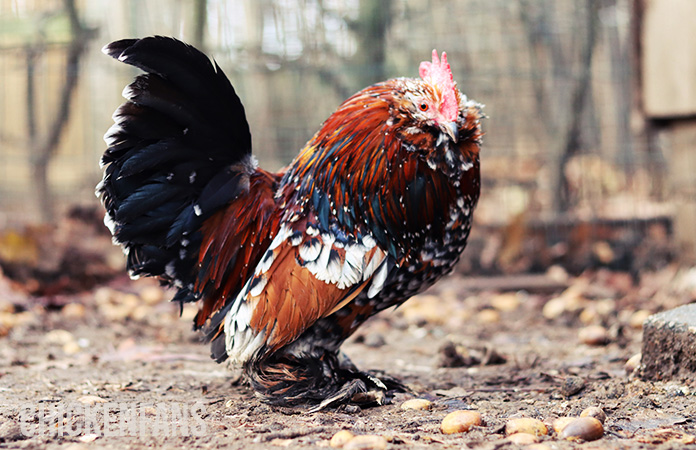
They have interesting muffs, beards, and feathered feet. The millefleur color pattern occurs naturally and mimics the color patterning of the Olandsk Dwarf. It shows as a mix of blue, black and brown speckles on a white background.
| Olandsk Dwarf | Belgian d’Uccle Bantam | |
| Eggs | 200-250 per year | 150 per year |
| Egg Color | Whitish, tinted | White or cream |
| Egg Size | Small | small |
| Weight | 1 to 2.5 pounds | 1.5 to 2 pounds |
| Hardiness | Great for the cold | Enjoy cold |
| Temperament | Friendly, active | Easygoing |
| Beginner-friendly | Yes | Yes |
| Color | No standard, but usually white with spatterings of red, black and gray | Many different color varieties |
| Cost | $50 for an unsexed chick | $15 for a female chick |
7. Bruges Fighter
These are Belgian gamefowl related to the Liege Fighter. The breed is hundreds of years old and known for its fighting quality. They have a unique black skin and metallic feather combination, reminiscent of an Ayam Cemani, but with red counterparts in the feathers and comb. They’re endangered in their native Belgium now.
Alternative: Old English Game
They’re very similar breeds, though Old English Game are much less expensive! Old English Game have 28 different color variants recognized by the American Poultry Association, so you shouldn’t have any trouble getting a unique rooster.
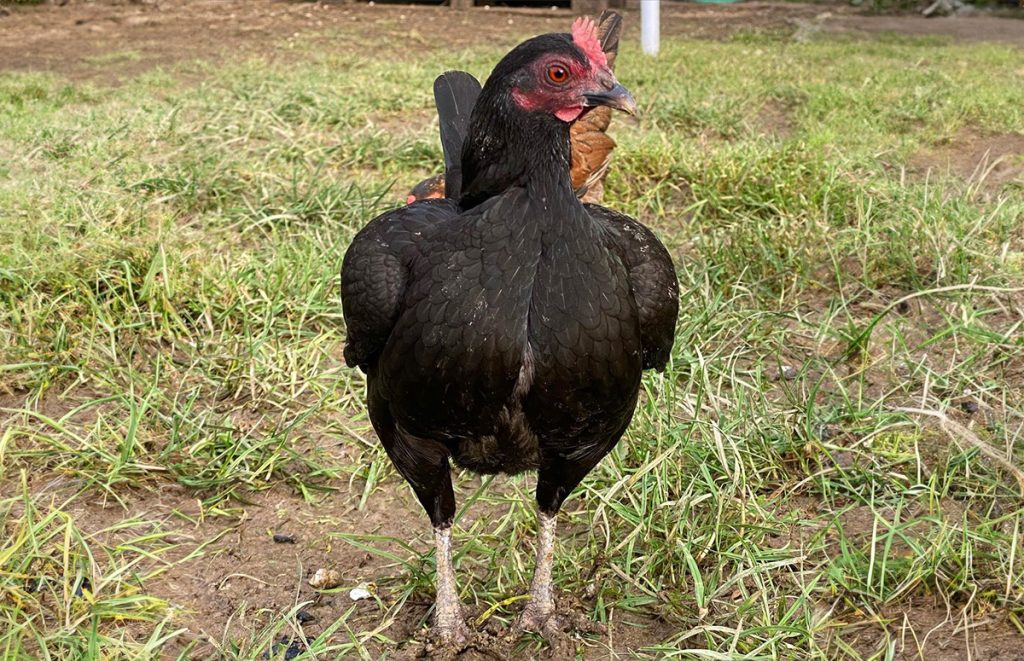
Some are even bluish-black if you want one resembling a Bruges Fighter. You can probably get a breeder to help you source young roosters with those colors.
They’re mostly kept for their looks, with long tail feathers and a pleasantly arrogant demeanor. They come in three sizes too, which is helpful if you’re looking for a smaller show rooster!
| Bruges Fighter | English Game | |
| Eggs | 150 per year | 160-180 per year |
| Egg Color | Tinted | White tinted |
| Egg Size | Large | Medium to large |
| Weight | 8-12 pounds | Carlisle, the larger variety, is 6-8 pounds. The smaller Oxford only reaches around 4 pounds. |
| Hardiness | Cold tolerant | Cold and heat tolerant, though heat not preferred |
| Temperament | Friendly | Tough and spunky but friendly |
| Beginner-friendly | Yes | Yes |
| Color | Can be a variety of colors | 28! |
| Cost | $60 for unsexed chicks, $100 for juvenile male | $12 for unsexed chicks |
8. Deathlayer
Deathlayers probably got their name from a mix-up in translation over time, tracing back to their German heritage. Many attribute the name, directly translated from German, to the fact that they are profligate layers until the day they die.
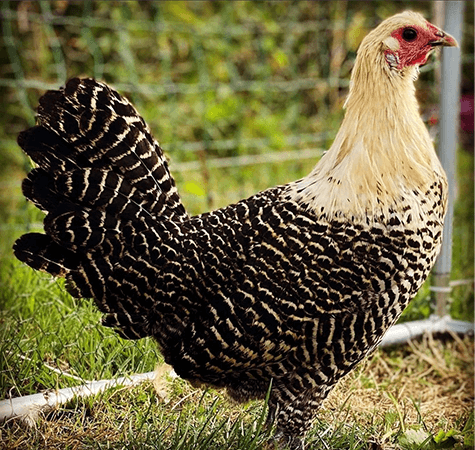
It fits well with their plumage. Roosters have fantastic feathering, often a stark white head and black body, reminiscent of Marilyn Manson or maybe Kiss? Hens usually have beautiful white heads and black bodies with pencil markings.
They’re expensive because they’re rare and a very old breed (over 400 years). They are endangered but have been recently introduced to the United States as a means to support breeding and protection.
Alternative for that Deathlayer Chicken: Egyptian Fayoumi
These look very similar to the Deathlayer, though they might not be quite the rock star! They are believed to be an ancient breed, though the varieties in the United States are not recognized as pure breeds.
They have the same silver-penciled and gold-penciled look as Deathlayers. Their skin is slate-blue. They’re smaller than Deathlayers if you prefer a smaller chicken, but they like a free-range life.
| Deathlayer | Egyptian Fayoumi | |
| Eggs | 200 – 250 | 200 |
| Egg Color | White | Cream white |
| Egg Size | Medium | Medium |
| Weight | 8-12 pounds | 3 to 4.5 pounds |
| Hardiness | Cold or heat tolerant | Not cold tolerant |
| Temperament | Friendly and active | Free spirits |
| Beginner-friendly | Yes | No, like to live free range and roost high up, in trees |
| Color | Varies, often black bodies with white feathering on the head, pencil marking | Silver pencil or gold pencil |
| Cost | $60 for an unsexed chick | $6 for a female chick |
9. Indio Gigante
We already mentioned this lovely breed as an alternative to the Dong Tao, but Indio Gigantes are still one of the most expensive chickens out there, at $70 a chick.
If you want to think about an even cheaper variety, you might consider a root to the Indio Gigante, the Malay. Indio Gigantes were created by crossbreeding large gamecock Malayoid variety chickens with local chicken breeds, caipira.
Alternative for Indio Gigante: Malay
Malays are one of those types of Malayoid gamecock varieties and have a similar appearance to the Indio Gigante. Some might even find their stance even more interesting! They hold themselves upright, and while not similar to a dragon, they look almost like a dinosaur.
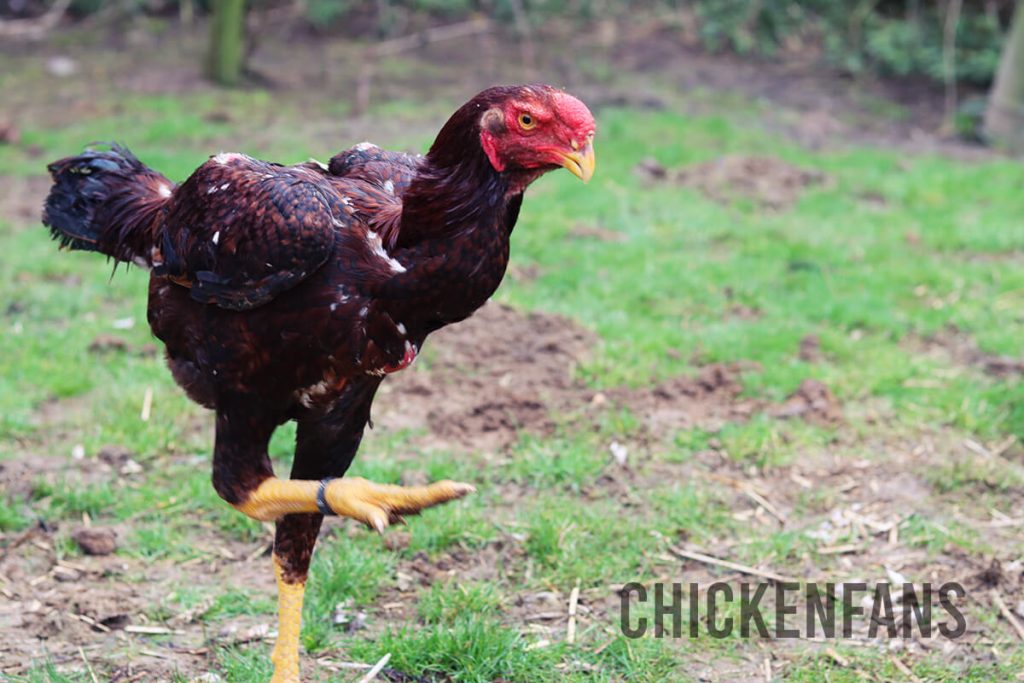
They’re another one to consider if you’re seeking a fierce, majestic, large bird for your backyard. You might have trouble finding purebreds from Malaysia due to import/export regulations, but many countries and regions have bred versions of Malays over the years.
Some of those varieties might even be preferred, as they have fewer issues with disease from inbreeding.
| Indio Gigante | Malay | |
| Eggs | 160 eggs per year | 120 eggs per year |
| Egg Color | White, beige, blue, green or red | Light brown |
| Egg Size | Large | Medium to large |
| Weight | 6.5 to 11 pounds | Up to 7.5 pounds |
| Hardiness | Cold and heat tolerant | Prefer heat, warm, can tolerate some cold |
| Temperament | Friendly | Fighters, can’t be around other chickens |
| Beginner-friendly | Yes | No – need space, height, not good for children with sharp beaks |
| Color | Any color feathers, usually brightly colored, always with yellow/orange feet and legs | Multiple varieties, small wattles and combs |
| Cost | $70 per unsexed chick | $20 hatching eggs |
10. Barnevelder
These birds are just as their nickname “Barnies” implies – they’re friendly, plump backyard chicken pets that your whole family will love. They’re also dual-purpose, good for eggs and meat. The decent bloodlines that produce dark brown eggs are expensive because they are “uncommon” in the United States.
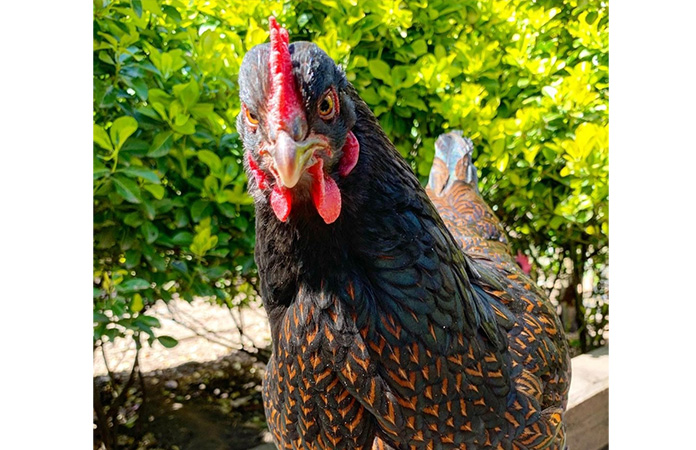
Many people like Barnevelders for their double-laced coloring, meaning they look like they have blackish-blue feathers interwoven with brownish-red feathers, creating a beautiful coat.
Barnies Compared to Wyandottes
The Gold Laced Wyandotte is much less expensive and has a similar black-laced coat with a brown ground color. This gives the birds a similar stunning scalloped pattern all over their body.
| Barnevelder | Laced Wyandotte | |
| Eggs | 200 per year | 200 per year |
| Egg Color | Brown to dark brown | (Light) Brown |
| Egg Size | Large | Large |
| Weight | 6-8 pounds | 6.5 to 8 pounds |
| Hardiness | Like cold | Like cold |
| Temperament | Friendly | Friendly, but active and assertive |
| Beginner-friendly | Yes | Yes |
| Color | Four – double-laced silver (for bantams), double-laced blue, black, and white. | Varies, laced coloring is common |
| Cost | $60 | $5 for a female chick |
Summary
Do you really need the most expensive chicken breed? Or is their look-a-like the best option?
After comparing all options, you might decide you still want the expensive breed. Some are too unique, like the Dong Tao. There are really no alternatives if you want fat feet and Vietnamese heritage.
Investing in expensive breeds is also a great idea if you want to help conserve endangered ones. There are many more varieties out there that can use your help in that case.
If you just want a certain kind of famous expensive breed for its looks and/or temperament, however, there are many other more economical options out there for you!
Almost all of these breeds have a doppelganger species, a luxury copycat that will serve the same purpose. Sometimes, the alternative is even better, with a higher capacity to produce or a better temperament for your family.
There are hundreds of chicken breeds in the world! If you want to get to know them all, rare or common, heritage or hybrid, go to our ‘All Chicken Breeds & Types Worldwide: List of 500+ Breeds‘.

